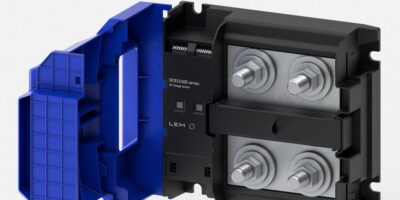LEM launches a new series of DC energy meters for fast and megawatt EV chargers.
LEM has launched a new series of DC meters with the introduction of the DCES600 and DCES1500. These meters address a broad range of DC current-sensing requirements. They are designed to achieve class B accuracy at charger level with currents of up to 1500A, at operating temperatures from –40°C to +85°C without derating.
The new meters comply with international legal metrology certifications and calibration standards, ensuring accuracy and traceability for kWh billing and regulatory compliance in EV charging applications. This is important when charging electric trucks, where the cost of transportation directly depends on the precise reporting of the amount of energy delivered during charging.
Designers can access the DCES meters over an RS485 communication interface that provides cybersecurity features. These features include authentication of measurements using digital signatures, and facilities that enable secure remote maintenance and firmware updates. These facilities are designed to help reduce the operating costs of EV chargers built using the DCES meters. LEM is also offering a comprehensive set of application programming interfaces (APIs) to enable quick and easy software integration, and other software tools to ease testing and product integration.
The DCES meters are available with an optional remote display unit, the RDU, which gives OEMs and systems integrators greater flexibility in the design of the human/machine interface compared to solutions with an integrated display. The RDU can be mounted on a front panel, DIN rail, or base plate, has a slim form factor, and doesn’t need additional connections, such as communications lines or power sources, other than its link to the DCES meters.
Both DCES meters have a robust mechanical design, with a glass-fibre reinforced case, which offers insulation resistance at up to 1000V DC for the DCES600, and up to 1500V DC for the DCES1500. They also offer large power terminals with large current contact areas. The DCES600 has two M10 studs that enable busbar termination to be screwed down onto a contact area of 33 x 36mm. In the DCES1500, there are four M12 studs in two pairs, with each pair offering a combined contact area of 45 x 100mm. The busbars for both meters are specified to operate at up to 110°C. Both meters are supplied with a protective cover and seals.
The DCES meters offer real-time reporting of voltage, current, temperature and energy. These values can be used for both direct energy measurement, for example for billing purposes, and as part of a system management strategy for ensuring the end equipment is kept within safe operating limits through remote system diagnostics.




